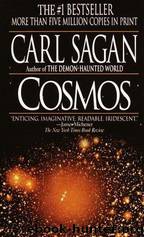COSMOS by Carl Sagan

Author:Carl Sagan [Sagan, Carl]
Language: eng
Format: mobi
Tags: archivio inglese, cover, english
ISBN: 9780345331359
Publisher: Random House, Inc.
Published: 2012-02-07T10:53:49+00:00
* As an aid to confusion, Ionia is not in the Ionian Sea; it was named by colonists from the coast of the Ionian Sea.
This revolution made Cosmos and Chaos. The early Greeks had believed that the first being was Chaos, corresponding to the phrase in Genesis in the same context, ‘without form’. Chaos created and then mated with a goddess called Night, and their offspring eventually produced all the gods and men. A universe created from Chaos was in perfect keeping with the Greek belief in an unpredictable Nature run by capricious gods. But in the sixth century B.C., in Ionia, a new concept developed, one of the great ideas of the human species. The universe is knowable, the ancient Ionians argued, because it exhibits an internal order: there are regularities in Nature that permit its secrets to be uncovered. Nature is not entirely unpredictable; there are rules even she must obey. This ordered and admirable character of the universe was called Cosmos.
But why Ionia, why in these unassuming and pastoral landscapes, these remote islands and inlets of the Eastern Mediterranean? Why not in the great cities of India or Egypt, Babylonia, China or Mesoamerica? China had an astronomical tradition millennia old; it invented paper and printing, rockets, clocks, silk, porcelain, and ocean-going navies. Some historians argue it was nevertheless too traditionalist a society, too unwilling to adopt innovations. Why not India, an extremely rich, mathematically gifted culture? Because, some historians maintain, of a rigid fascination with the idea of an infinitely old universe condemned to an endless cycle of deaths and rebirths, of souls and universes, in which nothing fundamentally new could ever happen. Why not Mayan and Aztec societies, which were accomplished in astronomy and captivated, as the Indians were, by large numbers? Because, some historians declare, they lacked the aptitude or impetus for mechanical invention. The Mayans and the Aztecs did not even - except for children’s toys - invent the wheel.
The Ionians had several advantages. Ionia is an island realm. Isolation, even if incomplete, breeds diversity. With many different islands, there was a variety of political systems. No single concentration of power could enforce social and intellectual conformity in all the islands. Free inquiry became possible. The promotion of superstition was not considered a political necessity. Unlike many other cultures, the Ionians were at the crossroads of civilizations, not at one of the centers. In Ionia, the Phoenician alphabet was first adapted to Greek usage and widespread literacy became possible. Writing was no longer a monopoly of the priests and scribes. The thoughts of many were available for consideration and debate. Political power was in the hands of the merchants, who actively promoted the technology on which their prosperity depended. It was in the Eastern Mediterranean that African, Asian, and European civilizations, including the great cultures of Egypt and Mesopotamia, met and cross-fertilized in a vigorous and heady confrontation of prejudices, languages, ideas and gods. What do you do when you are faced with several
Download
This site does not store any files on its server. We only index and link to content provided by other sites. Please contact the content providers to delete copyright contents if any and email us, we'll remove relevant links or contents immediately.
Turbulence by E. J. Noyes(7308)
Tools of Titans by Timothy Ferriss(7234)
Astrophysics for People in a Hurry by Neil DeGrasse Tyson(4746)
Design of Trajectory Optimization Approach for Space Maneuver Vehicle Skip Entry Problems by Runqi Chai & Al Savvaris & Antonios Tsourdos & Senchun Chai(4609)
Room 212 by Kate Stewart(4300)
Pale Blue Dot by Carl Sagan(4205)
Secrets of Antigravity Propulsion: Tesla, UFOs, and Classified Aerospace Technology by Ph.D. Paul A. Laviolette(4171)
The David Icke Guide to the Global Conspiracy (and how to end it) by David Icke(4054)
A Journey Through Divination and Astronomy by Publishing Pottermore(4037)
Apollo 8 by Jeffrey Kluger(3290)
Losing the Nobel Prize by Brian Keating(3242)
Goodbye Paradise(3126)
COSMOS by Carl Sagan(3070)
Brief Answers to the Big Questions by Stephen Hawking(2991)
How to Read Water: Clues and Patterns from Puddles to the Sea (Natural Navigation) by Tristan Gooley(2977)
The Five People You Meet in Heaven by Mitch Albom(2966)
The Order of Time by Carlo Rovelli(2839)
How to Read Nature by Tristan Gooley(2785)
A Brief History of Time by Stephen Hawking(2570)
